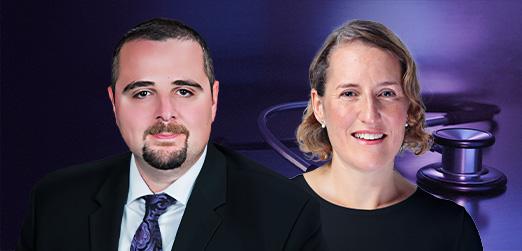- Home
- Medical Options for Advanced HFpEF/HFmrEF Patients: An Expert-Guided Virtual Ward Round
Medical Options for Advanced HFpEF/HFmrEF Patients: An Expert-Guided Virtual Ward Round
- Heart Failure
- HFpEF
Available Credit:
- 1.00
Course Published On:
Course Expiry Date:

Overview
This virtual ward roundtable offers a comprehensive educational experience for healthcare professionals managing complex HFpEF and HFmrEF patients. Chairing the session, Dr Biykem Bozkurt (Baylor College of Medicine, US) is joined by distinguished experts Dr Muthiah Vaduganathan (Brigham and Women’s Hospital and Harvard Medical School, US) and Prof Pardeep Jhund (University of Glasgow, UK).
During the roundtable, the faculty review two case studies and share their expert perspectives on the presented cases for managing high-risk HFmrEF/HFpEF patients, highlighting gaps and challenges. The discussion includes exploring current guidelines, applying an evidence-based approach and a live audience Q&A.
Support Statement
This programme is supported by an unrestricted educational grant from Bayer.
Disclosure
In compliance with EBAC guidelines, all speakers/chairpersons participating in this programme have disclosed or indicated potential conflicts of interest which might cause a bias in the presentations.
The Organising Committee/Course Director is responsible for ensuring that all potential conflicts of interest relevant to the event are declared to the audience prior to the CME activities.
Terms & Conditions
Radcliffe Education requires contributors to our CME programmes to disclose any relevant financial relationships that have occurred within the past 12 months that could create a conflict of interest. These will be identified in the faculty section if applicable.
The session, ‘Medical Options for Advanced HFpEF/HFmrEF Patients: An Expert-Guided Virtual Ward Round’ is accredited by the European Board for Accreditation of Continuing Education for Health Professionals (EBAC) for 1 hour of external CME credits.
Each participant should claim only those hours of credit that have actually been spent in the educational activity. EBAC works according to the quality standards of the European Accreditation Council for Continuing Medical Education (EACCME), which is an institution of the European Union of Medical Specialists (UEMS).
Through an agreement between the European Board for Accreditation in Cardiology and the American Medical Association, physicians may convert EBAC External CME credits to AMA PRA Category 1 Credits™. Information on the process to convert EBAC credit to AMA credit can be found on the AMA website.
Instruction to Participants
There is no fee for taking part in this online learning activity.
Activities are designed to be completed within 60 minutes and must be completed by the registered user. Physicians should only claim credits for time spent on the activity. To successfully earn credit, participants must complete the activity in full in the indicated time frame.
To complete the course and claim certification participants must:
- Read the course outline information supplied and complete pre-test questions if supplied prior to starting the activity. Users must read and study the activity in its entirety before completing the post-test questions
- Your results will be automatically saved and if a pass score is achieved (where applicable), you may be eligible to claim credit for the activity and receive a certificate of completion
Target Audience
- Cardiologists
- Internists
- Heart Failure Specialists
- General Practitioners
- Nurse Practitioners
- Cardiovascular Nurses
- Allied Healthcare Professionals
Learning Objectives
Upon completion of this activity, participants will be able to:
- Describe the current limitations of HFmrEF/HFpEF GDMT in advanced patients
- Select appropriate patients for advanced medical therapy
- Recall recent trial data for novel therapeutic approaches
- Use expert guidance to develop an evidence-based approach to managing advanced HFmrEF/HFpEF
Module |
Title |
Duration |
Speakers |
|---|---|---|---|
| Session 1 | Introduction and Case Study Results | 9m 8s | Biykem Bozkurt Muthiah Vaduganathan Pardeep Jhund |
| Session 2 | Exploring the Guidelines | 4m 20s | Biykem Bozkurt |
| Session 3 | Applying an Evidence-Based Approach: FINEARTS-HF | 7m 24s | Muthiah Vaduganathan |
| Session 4 | Applying an Evidence-Based Approach: MRAs in HF | 9m 21s | Pardeep Jhund |
| Session 5 | Practical Use of MRAs: Expert Discussion | 12m 33s | Biykem Bozkurt Muthiah Vaduganathan Pardeep Jhund |
| Session 6 | Patient Cases Revisited: How Were They Treated? | 5m 5s | Biykem Bozkurt Muthiah Vaduganathan Pardeep Jhund |
| Session 7 | Audience Q&A | 13m 8s | Biykem Bozkurt Muthiah Vaduganathan Pardeep Jhund |
Introduction and Case Study Results
Duration: 9m 8s
Speakers: Biykem Bozkurt Muthiah Vaduganathan Pardeep Jhund
Practical Use of MRAs: Expert Discussion
Duration: 12m 33s
Speakers: Biykem Bozkurt Muthiah Vaduganathan Pardeep Jhund
Patient Cases Revisited: How Were They Treated?
Duration: 5m 5s
Speakers: Biykem Bozkurt Muthiah Vaduganathan Pardeep Jhund
Chair
Speaker
Medical Options for Advanced HFpEF/HFmrEF Patients: An Expert-Guided Virtual Ward Round's programme has been accredited by the European Board for Accreditation of Continuing Education for Health Professionals (EBAC) for 1 CME point, equating to 1 hour of learning. Physicians may convert EBAC External CME credits to AMA PRA Category 1 Credits™.












